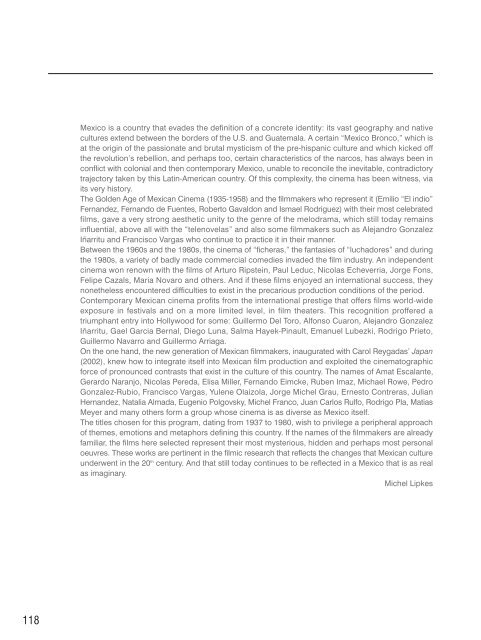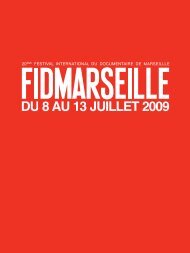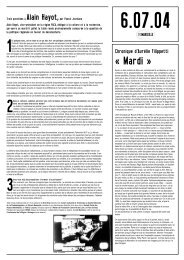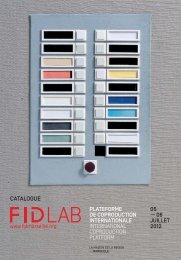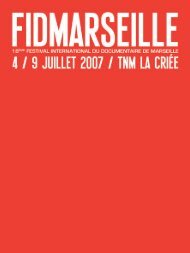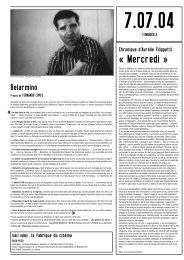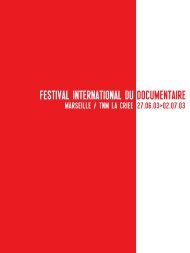FID Marseille 2011 - Festival international du documentaire de ...
FID Marseille 2011 - Festival international du documentaire de ...
FID Marseille 2011 - Festival international du documentaire de ...
You also want an ePaper? Increase the reach of your titles
YUMPU automatically turns print PDFs into web optimized ePapers that Google loves.
118Mexico is a country that eva<strong>de</strong>s the <strong>de</strong>finition of a concrete i<strong>de</strong>ntity: its vast geography and nativecultures extend between the bor<strong>de</strong>rs of the U.S. and Guatemala. A certain “Mexico Bronco,” which isat the origin of the passionate and brutal mysticism of the pre-hispanic culture and which kicked offthe revolution’s rebellion, and perhaps too, certain characteristics of the narcos, has always been inconflict with colonial and then contemporary Mexico, unable to reconcile the inevitable, contradictorytrajectory taken by this Latin-American country. Of this complexity, the cinema has been witness, viaits very history.The Gol<strong>de</strong>n Age of Mexican Cinema (1935-1958) and the filmmakers who represent it (Emilio “El indio”Fernan<strong>de</strong>z, Fernando <strong>de</strong> Fuentes, Roberto Gavaldon and Ismael Rodriguez) with their most celebratedfilms, gave a very strong aesthetic unity to the genre of the melodrama, which still today remainsinfluential, above all with the “telenovelas” and also some filmmakers such as Alejandro GonzalezIñarritu and Francisco Vargas who continue to practice it in their manner.Between the 1960s and the 1980s, the cinema of “ficheras,” the fantasies of “luchadores” and <strong>du</strong>ringthe 1980s, a variety of badly ma<strong>de</strong> commercial comedies inva<strong>de</strong>d the film in<strong>du</strong>stry. An in<strong>de</strong>pen<strong>de</strong>ntcinema won renown with the films of Arturo Ripstein, Paul Le<strong>du</strong>c, Nicolas Echeverria, Jorge Fons,Felipe Cazals, Maria Novaro and others. And if these films enjoyed an <strong>international</strong> success, theynonetheless encountered difficulties to exist in the precarious pro<strong>du</strong>ction conditions of the period.Contemporary Mexican cinema profits from the <strong>international</strong> prestige that offers films world-wi<strong>de</strong>exposure in festivals and on a more limited level, in film theaters. This recognition proffered atriumphant entry into Hollywood for some: Guillermo Del Toro, Alfonso Cuaron, Alejandro GonzalezIñarritu, Gael Garcia Bernal, Diego Luna, Salma Hayek-Pinault, Emanuel Lubezki, Rodrigo Prieto,Guillermo Navarro and Guillermo Arriaga.On the one hand, the new generation of Mexican filmmakers, inaugurated with Carol Reygadas’ Japan(2002), knew how to integrate itself into Mexican film pro<strong>du</strong>ction and exploited the cinematographicforce of pronounced contrasts that exist in the culture of this country. The names of Amat Escalante,Gerardo Naranjo, Nicolas Pereda, Elisa Miller, Fernando Eimcke, Ruben Imaz, Michael Rowe, PedroGonzalez-Rubio, Francisco Vargas, Yulene Olaizola, Jorge Michel Grau, Ernesto Contreras, JulianHernan<strong>de</strong>z, Natalia Almada, Eugenio Polgovsky, Michel Franco, Juan Carlos Rulfo, Rodrigo Pla, MatiasMeyer and many others form a group whose cinema is as diverse as Mexico itself.The titles chosen for this program, dating from 1937 to 1980, wish to privilege a peripheral approachof themes, emotions and metaphors <strong>de</strong>fining this country. If the names of the filmmakers are alreadyfamiliar, the films here selected represent their most mysterious, hid<strong>de</strong>n and perhaps most personaloeuvres. These works are pertinent in the filmic research that reflects the changes that Mexican cultureun<strong>de</strong>rwent in the 20 th century. And that still today continues to be reflected in a Mexico that is as realas imaginary.Michel Lipkes


